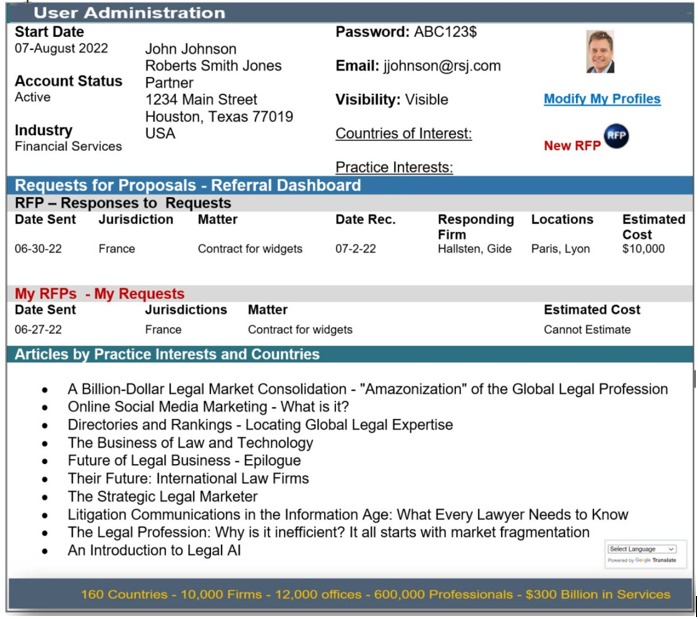What are Social Media?
We see social media referred to in two ways. One is a
substitution for what is called social networking. You will hear people say,
“Yes, our firm does social media,” or “No, I have no idea what I’m doing in
social media.” These comments tend to refer more to the actions, which are
social networking, than the platforms, social media, which leads to my
definition of social media.
Social media are those platforms, or media, that are
virtual, and that offer the ability to interact and establish relationships by
being “social” with our intended audiences. The latter enables the former. Just
like broadcast media (what we see on TV) is a platform that delivers a message,
so, too, social media deliver messages.
These media are relatively new to the entire world and are certainly new to the legal profession, where we tend to follow marketing and communication trends started elsewhere. The fact that we were not allowed to advertise or promote before Bates v. State Bar of Arizona in 1977 has resulted in our profession’s adoption of many marketing practices to be a few years behind those outside the legal profession
Why Is Social Media
Important?
The use of social media in law firms at the individual,
team, group, business unit, and firm level is the most comprehensive
development in communication that the profession has seen since the advent of
email. This statement might seem far-reaching to some, but it was not that long
ago that firms introduced email as a new way of communicating with the outside
world via a simple keyboard and computer. What was exciting to some was
overwhelming and scary to others. This newfangled method of communicating with
clients changed communication forever.
So too has the development of social media and the use of
social networking, not only for attorneys and administrators, but also, more
importantly, for our clients. Instead of the introduction of one tool (email),
we now see the introduction of an entire set of tools, or media, that enable us
to reach out and touch many people at a moment’s notice, as well as to listen
and learn from them.
This ability to communicate with the masses has opened up
new opportunities for lawyers, whether they are solo practitioners or are one
of 7,000 professionals in a firm. You now have tools at your disposal that
provide ways for you to show your clients, potential clients, referral sources,
media, and other important parties what makes you qualified in the areas in
which you practice and what makes you different than other lawyers with whom
you compete.
Even more important is that these tools allow you to see what is important to your clients and prospects; the issues that have an impact on them; the changes they are facing on a daily basis; and for you to then stay in touch with, if not ahead of, what they need and how you might fit into that equation. With this much opportunity, these are not tools to take lightly.
What Can Social Media Do for
Me?
Let’s take a look at a few of
the main opportunities that social media present to you.
Positioning
It doesn’t take long to realize that human beings are bombarded by thousands of messages every day and are finding it increasingly difficult to wade through all of those messages. You face a great deal of competition for that coveted space in the minds of your clients and potential clients, which is referred to as the position you would like to take in their minds when they have a need for services like yours. No two attorneys have the same goals, so where you might want to be thought of as having the position as the top lawyer in your practice area, one of your competitors might be fighting to take over what he perceives to be the second position in the minds of his clients. He might feel that is better than where he currently resides when it comes to being called to the table in your and his practice area.
The Level Playing Field
Social media can be the great equalizer because it can help accomplish your positioning goals. The playing field has now become more level than ever before. Just because you come from a firm of 2,000 lawyers with an amazing industry team that is devoted to taking care of the largest brands on Earth does not mean you will come across that way online. Conversely, just because you are one of 10 lawyers in a boutique firm tucked away in a corner in a tiny suburb of Minneapolis, Minnesota, this definitely does not mean that you can’t showcase the skills and personality that exist in your firm in such a way that your potential clients take notice. You have an opportunity to stand out if you and your firm take charge of your online presence, and if you commit to learning and using these tools that seem much more daunting than they really are.
Relationship Building
There is no doubt that these tools can help peel back the layers of unfamiliarity that often exist for quite a while with clients and potential clients. When you take the time to get to know others online, it makes your offline, or face-to-face, communication that much easier and richer because you have already dispensed with the pleasantries and issues that often fill the initial few meetings you have in person. I have experienced this first- hand many times. When I get to know someone online first, by the time we meet face-to-face, we both feel as if we had already met and that we know a great deal about one another. This lessens the barriers to forming strong relationships, which is a definite goal of networking and business development.
One to Many vs. One to One
You also have the ability to form connections with more people at the same time, thus making your networking efforts much more productive and efficient. When you interact with others via social media, there is the potential for the friendly exchange to be witnessed by tens, hundreds, or thousands of others who are also getting to know you at the same time. This is not, of course, the exchange of legal advice, but rather conversations that help break the ice. Being able to communicate one to many is one of the gifts of social networking that you should be taking advantage of in your daily routine.
More Control Over Your
Messages
Another very important aspect of social media involves
controlling your messages in public spaces, in media, and in the marketplace,
which has been and always will be critically important to communicating your
brand. I remember my days as an in-house director of marketing at a law firm
and the frustration I, our department, and many lawyers often had when we would
work to place a story in the media, finally earning a mention in a story, and
then discover that neither the firm’s name nor any sufficient information about
the attorney involved were included in that story. All that work for no mention!
We understood why this happened, as journalists often shared that it was not
their job to promote our law firm, or any firm. Their job was to tell the
story.
Given all of that, one of the most important and most powerful reasons I can give you to spend time learning how to use social media is that you can now take better control of the messages that you and your firm need to send. No longer do you have to rely solely on publications to write and speak on your behalf, hoping that your 30-minute interview ends up with more than a five-second sound bite, or a sentence, or even a blind mention in an article. When you do get those, that will be gravy, but you can now craft those messages, and decide where and how you would like them to distribute them on self-owned media. You get to control the message and the medium much more than ever before. You become the publisher of your information, your brand, and your message.
The Process of Implementing a
Social Media Plan for Your Firm
In the perfect world, your social media plan should fall out of a larger marketing plan, which then gives birth to a content marketing plan, which then helps build your social media plan, but having all of those pieces in place in a law firm is often a luxury. It is my job to eliminate the inertia that can come from not having all of those pieces in place first, which is why we need to discuss how to move ahead with a social media and social networking initiative in your firm even if all of the other pieces are not in place. Progress can often be made by taking baby steps,and is often accomplished through a side-door strategy such as the introduction and efficient use of social media. We can tackle Rome later!
Here are the concepts I’d
like you to keep in mind as you create your social media plan.
To get started:
· Establish need. Sell your firm based on the knowledge and need we have discussed here.
· Strengthen your weaknesses. If skills and knowledge are needed, hire them.
· Make sure commitment is secure. To go this alone with no support is a surefire recipe for frustration and even disaster.
· Decide who will be in charge. Too many cooks managing this process can cause frustration, a lack of focus, conflicting messages being distributed, and a lack of common vision. Conversely, many cooks moving in the same direction are a recipe for success.
· Build social media guidelines. These don’t have to be rocket science, but they do need to take accepted ethical restrictions into account, as well as best practices for effective online networking.
· Practice the 3 Cs: Communicate, communicate, and communicate! You need to let everyone in the firm know what is going on at every step of this process in order to achieve buy-in and consistency. If not, dropping a social media plan on everyone after it has already been decided can cause dissention and a lack of ownership in the effort, which can be destructive.
· Adjust expectations: Know that using social media is not a cure-all for internal weaknesses. You can’t communicate what you wish was happening in your practice or at the firm because it will come back to haunt you when your prospects discover otherwise.
The Process for Building Your
Social Media Plan
Start with the basics. This process resembles the process you undertake to create a marketing and business development plan.
· Benchmark your and your competitors’ digital presence.
· Set realistic goals based on existing plans.
· Decide how you are going to measure success.
· Decide what your social media brand is going to be.
· Identify clients, influencers, and advocates.
· Decide what position you are targeting in your clients’ and prospects’ minds.
· Create a strategy for each target audience you want to reach.
· Decide what messages you want each target to hear and understand about you.
· Create an editorial calendar.
· Seek training for those social networking basics and practices that need to be in place for all of this to work smoothly.
Final Words of Advice
Don’t overthink it.
By this, I mean don’t make it more difficult than it needs
to be. You want people to come to know and trust you, and to understand how you
can help them. That is one of the main benefits of social networking. It can
pave the way for advancing your business relationship. Remember to act like you
would anywhere else where you are in front of people.
Listen and speak to people.
Listen to what people are saying and writing online. Ask them questions, following up on what they’ve written or said. Share their thoughts and content with others. Be interesting by providing feedback and perspective on issues that have to do with your practice area. Have some fun with your connections, which doesn’t mean throwing caution to the wind, but simply to show a side of you that is approachable and easy to talk to. Then, every once in a while, after you’ve done all of this for a time, you may have then earned the right and the trust to talk about yourself now and then.
Play nicely.
Be sensible, kind, wise, and ethical in your online interaction with others. Don’t get involved in heated debates and arguments unless that is the brand you have decided you want to convey online, and only then if it serves your practice well. Many use their keyboard and the safety of their digital screens as a buffer zone that allows them to engage people when they wouldn’t otherwise do so if they were face to face. This is not a best practice.
Remember that social networking is a contact sport.
Social networking can’t survive on its own. It takes more than one person to be effective. It is definitely not broadcast media where you shout and promote in a one-sided manner. It is a process of consistent interaction with those you care about in order to discover ways to serve them. Always strive to find ways to bring value to those you connect with, and you will earn a reputation as a trusted advisor much more effectively than had you only promoted yourself constantly, which can get very old very fast.
________________________________________________________________





 Software
Software Law
Law Legal
Legal






